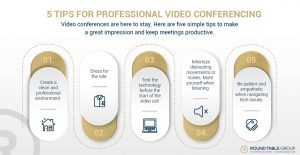Improve Your Remote Collaboration with Experts

The past two years have radically changed legal workflows, taking an already underway meandering course towards using remote collaboration tools and forcing it into a strong current. Historically, litigation preparation has included ample in-person meetings, collaboration processes, and court appearances. Now, for better or worse, virtual collaboration and communication tools are becoming a staple within litigation and increasing the need for remote collaboration protocols.
As litigators continue to incorporate remote collaboration tools and tactics into their workflow, it can be helpful to understand what types of solutions are being utilized by others in the industry. While some of these new technologies can be daunting, there are ways to take advantage of them and optimize their effectiveness.
Video Conferencing
Several courtrooms across the country have begun to integrate permanent video conferencing setups to accommodate the need for virtual presentation methods. The Center for Legal & Court Technology (CLCT) has taken the lead in this process, researching technologies and training teams specifically for this context.
While more permanent solutions that incorporate a combination of software and hardware are delivering a higher quality and pressure-tested experience, these solutions come at a very high cost. A majority of remote collaboration is currently taking place between litigators and experts who are working from home or a remote office, so simple video conferencing solutions such as Zoom, Microsoft Teams and Google Hangouts are leading the pack.
For those that are using these video conferencing platforms, here are a few tips to help ensure a smooth experience:
File Storage & File Sharing
Litigators are accustomed to the unwieldy number of documents inherent to the legal process. A massive amount of collaboration occurs using these documents, and the digitization of this material has become a critical challenge for legal teams aiming to modernize their tactics and workflows.
Prioritizing security is paramount given the complexity of engagement and collaboration with sensitive documents. Despite this, some firms still haven’t solidified a policy around the storage of data, which is the foundation of a secure process. According to the American Bar Association’s 2020 Solo and Small Firm Tech Report, only 60% of respondents reported having a formal policy for retaining information or data held by the firm. The ABA’s report from 2019 highlights less than 50% of respondents use encryption for file transfers, hacking prevention, or data storage.
Being proactive here is key, and to ensure documents are securely stored and shared requires research, vetting, and education around new tools. There are many considerations here including ease of use, budget, security, encryption options and data governance. Tools like Hightail, Dropbox and Filecloud have become leaders in this space, helping protect law firm’s information and ensuring remote collaboration is smooth.
Virtual Deposition & Mediation Preparation
There is justified apprehension around virtual deposition and mediation, as in-person presentations provide the potential for deeper connection and a more nuanced execution. However, this process is also being digitized and video depositions and testimonies are becoming prioritized in certain situations.
For skeptical litigators, there are advantages to this change and HD video can even translate body language and poise in more detail than ever before. One of the immediate advantages to virtual deposition and mediation is the ability to have an expert present without the travel and accommodation costs traditionally required. While the HD resolution can present some challenges for unprepared witnesses, it also presents opportunities for those nimble enough to adapt to these new platforms.
Some of the platforms and solutions that have emerged alongside the influx of virtual deposition and mediation include StoryCloud, eDepoze, and Mediate2Go. All these pieces of software aim to create a seamless experience that connects participants while offering virtual moderation, technical support, transcripts, exhibit logs, document management, scheduling and more.
The trajectory of innovation and changes in how firms view remote work spurred by the pandemic suggest legal teams should become comfortable with virtual processes. There are pros and cons to this evolution, but hopefully litigators can find ways to improve their workflow and increase the efficiency of their expert witnesses as everyone adapts to this “new normal”
For more than 25 years, Round Table Group has helped litigators locate, evaluate, and employ the best and most qualified expert witnesses. Round Table Group is a great complement to any litigator’s quest for an expert witness and our search is always free of charge. Contact us at 202-908-4500 for more information or start your expert search now.


